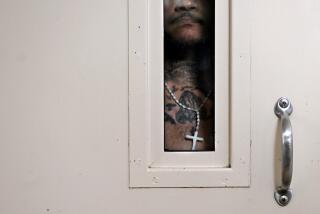Warning that coronavirus cases could rise, ACLU sues O.C. sheriff to free more inmates

Accusing the Orange County Sheriff of failing to adequately protect inmates from the coronavirus, the ACLU has filed a federal lawsuit seeking to create more social distancing in the jails, with the first step being the release of medically vulnerable inmates.
The lawsuit filed by the American Civil Liberties Union of Southern California accuses Sheriff Don Barnes of violating the constitutional rights of inmates and cites a public health expert who warns 500 inmates are medically vulnerable and that COVID-19 could quadruple in the jails without immediate action.
It asks a federal judge to order the release of “vulnerable and disabled people” in the jails with a public health expert appointed to oversee a comprehensive plan for social distancing, increased cleaning, quarantining and care as well as testing and the wide distribution of personal protective equipment.
As of Thursday evening, Orange County’s three jails had 122 inmates who have tested positive for coronavirus. Three sheriff’s deputies have also tested positive, but they have all recovered.
“The Orange County Sheriff’s Department has repeatedly failed its obligation to protect the safety of people in its custody,” said Jacob Reisberg, a jail conditions advocate with the ACLU. “Under normal circumstances, this lack of care is shameful, but during COVID-19 it is catastrophic.”
The ACLU said it has identified more than 500 inmates in the jails who are “medically vulnerable” or disabled and should be released.
Sheriff Barnes has repeatedly rebuffed suggestions that he is not doing enough to protect inmates and opposes further releases, telling the county Board of Supervisors earlier this week that he has reduced the jail population by about 45% since Gov. Gavin Newsom in March issued the state’s stay-at-home-order and social distancing policy.
The jails housed 2,911 as of Tuesday compared with 5,303 inmates on March 7 before the state’s order went into effect, officials said.
The sheriff said he has “implemented extraordinary measures” to prevent the spread of COVID-19 and preserve jail operations.
“Today’s jail population occupies only 39% of our jail’s actual capacity of just over 7,400 beds,” Barnes said. “I will continue to take measures needed to ensure the capacity is available to maintain safe operations and preserve our ability to house criminal offenders. At this moment, the early release of specified low-level offenders and the actions by the courts provide the capacity to meet our current needs.”
Barnes said he has a duty to protect the public as well as safeguard the health of inmates.
“I am not supportive of extensive preemptive releases that go beyond what is necessary to keep the jail and community safe,” Barnes said. “I am confident that the measures we continue to take in the jails meet our obligation to provide for the safety of both inmates and staff.”
In seeking a federal judge’s order to force changes in the jails, the ACLU cited an opinion by Daniel Parker, a UC Irvine assistant professor of public health and epidemiology, who warned that the number of coronavirus cases in the jails could quadruple by next week without immediate action.
In filing the case Thursday, ACLU attorneys and an Orange County law firm allege the disability rights of inmates are being violated.
Among the plaintiffs they cited are: Don Wagner, a 68-year-old cancer survivor who attorneys said is especially vulnerable because he has to regularly get his blood pressure and thyroid levels checked. They also noted he is only given one small bar of soap a week to clean himself.
Another inmate, Cynthia Campbell, 64, suffers from rheumatoid arthritis. She said and in court document that she cannot maintain six feet of distance from others when she receives medical treatment.
The ACLU also cite the risk to nursing mothers in crowded jails. In court documents, one of those mothers, Melissa Ahlman, 32, said, “I wonder what will happen if I get sick and it spreads to my baby through my milk. I worry that I will get sick in here and not be able to come home to her.”
More to Read
Sign up for Essential California
The most important California stories and recommendations in your inbox every morning.
You may occasionally receive promotional content from the Los Angeles Times.











